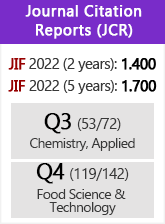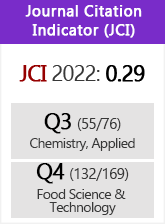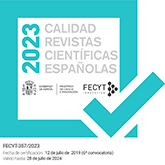Substrate influence on the frying process.
DOI:
https://doi.org/10.3989/gya.1998.v49.i3-4.726Keywords:
Fat transport, Frying process, Hydrolisis, Oxidation, Substrate.Abstract
The substrate affects frying oil in different ways during the frying. Water is released from the substrate, which is converted into steam and participates in hydrolytical processes of frying fats. The transfer of fat into the substrate and from the substrate into frying fat depends on the fat content in the substrate and on the frying conditions. Other, more polar substances than triacylglycerols, including pigments and their precursors, pass in frying oil. Oxidation processes in frying oil are inhibited by the substrate, especially by proteins, starch or phenolic substances. Mutagenic polycyclic aromatic heterocycles are produced during the interaction of frying fat and protein. Oxidation products are bound to proteins and other components of the substrate. Flavour substances are produced by reactions of oxidized frying oil with proteins and other sulphur and nitrogen substances in the substrate.
Downloads
Download data is not yet available.
Downloads
Published
1998-08-30
How to Cite
1.
Pokorny J. Substrate influence on the frying process. Grasas aceites [Internet]. 1998Aug.30 [cited 2024Jul.27];49(3-4):265-70. Available from: https://grasasyaceites.revistas.csic.es/index.php/grasasyaceites/article/view/726
Issue
Section
Monography
License
Copyright (c) 1998 Consejo Superior de Investigaciones Científicas (CSIC)

This work is licensed under a Creative Commons Attribution 4.0 International License.
© CSIC. Manuscripts published in both the printed and online versions of this Journal are the property of Consejo Superior de Investigaciones Científicas, and quoting this source is a requirement for any partial or full reproduction.All contents of this electronic edition, except where otherwise noted, are distributed under a “Creative Commons Attribution 4.0 International” (CC BY 4.0) License. You may read here the basic information and the legal text of the license. The indication of the CC BY 4.0 License must be expressly stated in this way when necessary.
Self-archiving in repositories, personal webpages or similar, of any version other than the published by the Editor, is not allowed.
















